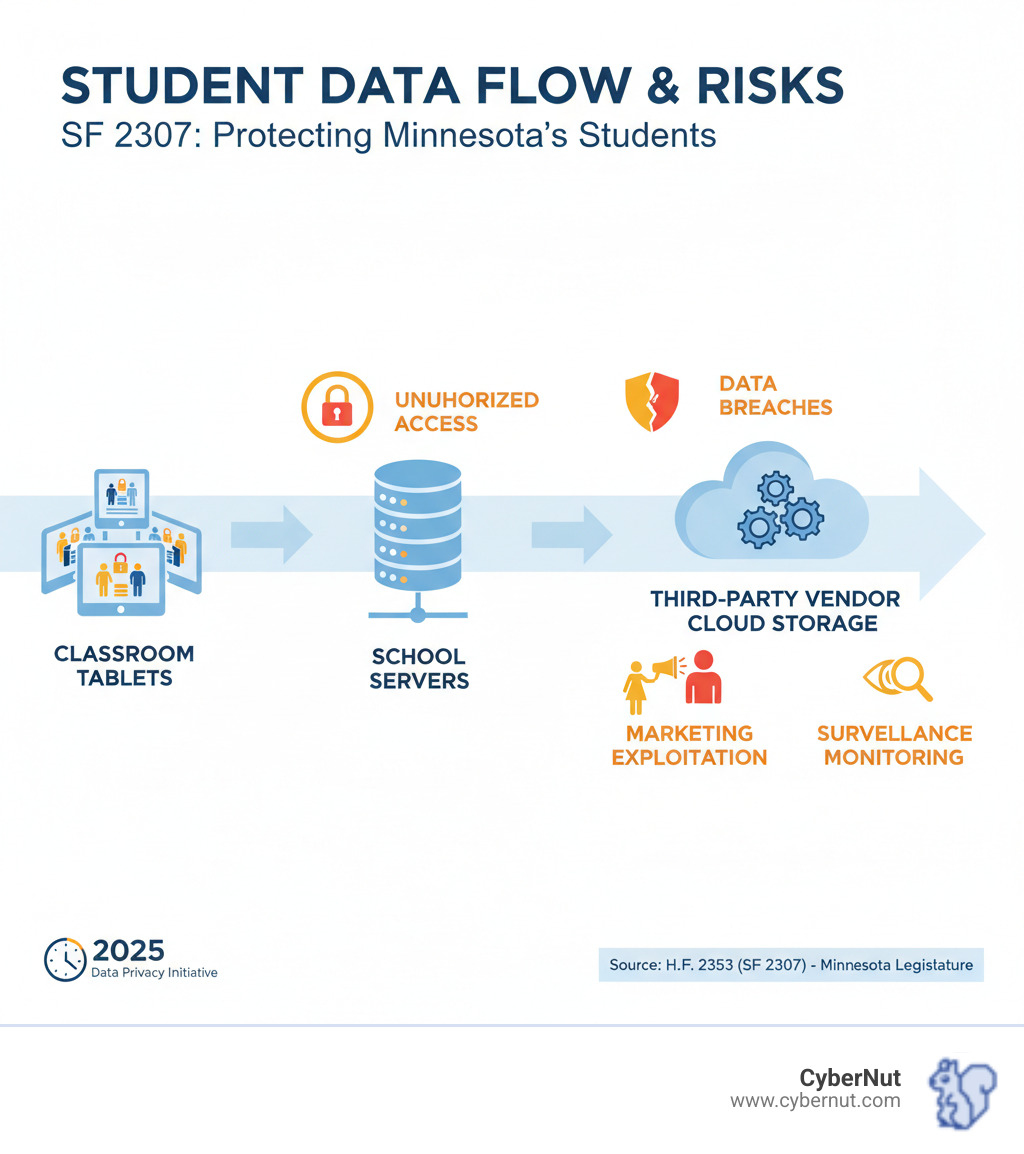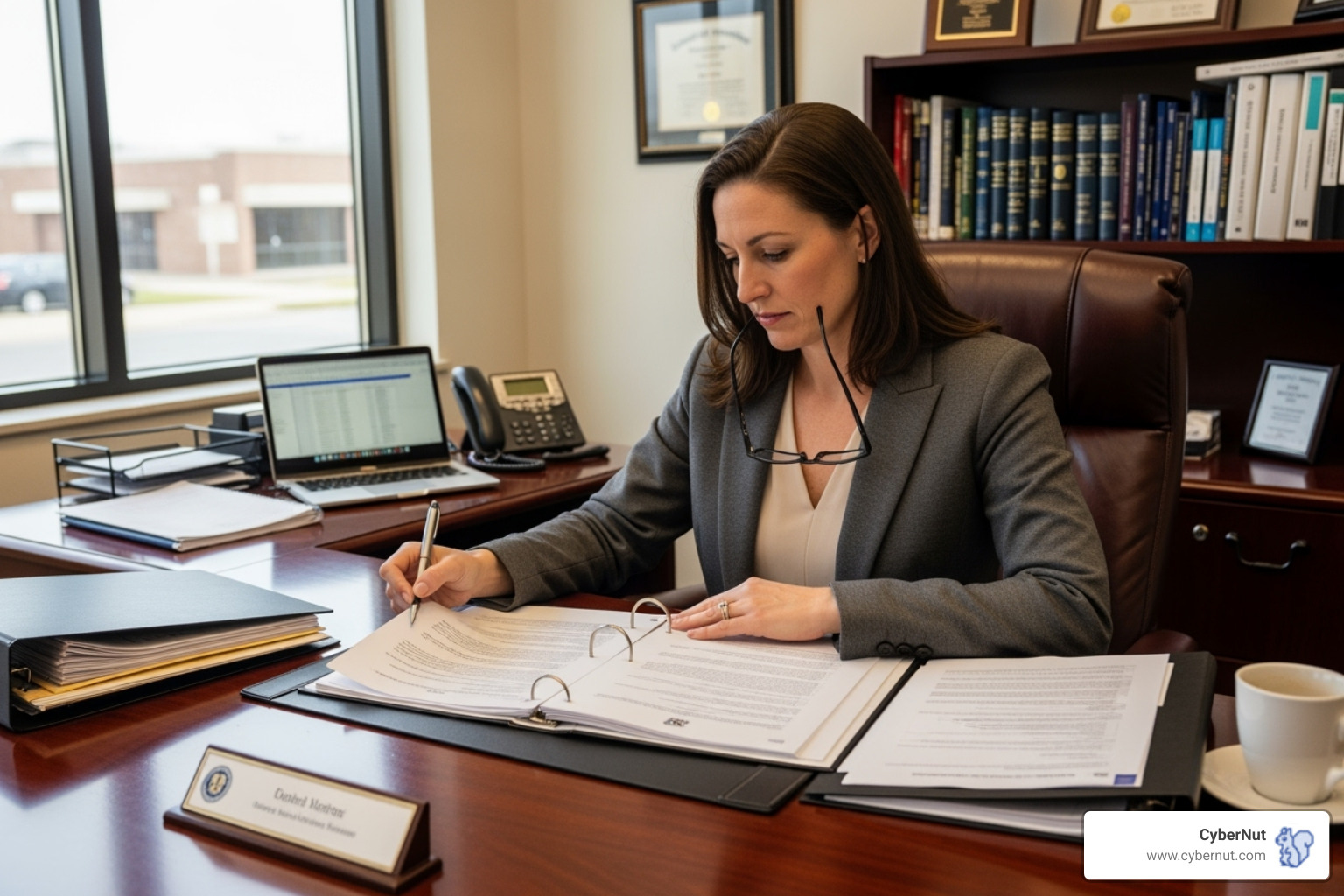
Oliver Page
Case study
October 23, 2025

SF 2307: Student Data Privacy and Third-Party Contracts refers to Minnesota's legislative effort to protect student information when schools use technology vendors. Enacted as House File 2353 (H.F. 2353) in May 2022, it amends the state's Government Data Practices Act to regulate how "Technology Providers" handle educational data.
Quick Summary:
As schools adopt more digital tools, the amount of student information flowing to third-party vendors has exploded. This data, from academic records to behavioral patterns, can end up with companies that have unclear data practices. Minnesota's law responds to these risks by creating clear boundaries for vendors, prohibiting targeted advertising and restricting electronic monitoring of school-issued devices.
For K-12 IT directors, this law introduces new compliance obligations beyond federal FERPA requirements. You must vet vendor contracts, notify parents of data-sharing, and ensure third parties have proper security safeguards. Non-compliance can lead to litigation, reputational damage, and a loss of parent trust.
However, compliance is more than avoiding penalties; it's about building a culture of data protection. Even the best policies fail if your team can't spot phishing attempts or handle student data securely.

Signed into law in May 2022, House File 2353 (originating as Senate File 2307) fundamentally changed how student data is handled in Minnesota. Often called SF 2307: Student Data Privacy and Third-Party Contracts, the law took effect for the 2022-2023 school year.

The law amends Minnesota's Government Data Practices Act to address modern digital classroom challenges, focusing on surveillance protection and data ownership. It establishes clear rules about who owns student information and what monitoring is off-limits on school-issued devices. Three key definitions shape its scope:
These definitions clarify who must follow the rules and what information is protected, preventing student data from being sold or exploited. At its core, the law ensures technology improves education without compromising student privacy.
For a detailed review, see the official text of H.F. 2353 on Minnesota's legislative website.
The Minnesota Student Data Privacy Act (H.F. 2353) establishes firm legal boundaries for handling student data, creating a protective shield around educational information when schools partner with technology companies.
The law's fundamental principle is that educational data is not the property of technology providers. This forms the basis for several key prohibitions:
SF 2307: Student Data Privacy and Third-Party Contracts requires that legally binding agreements include specific privacy protections.

Every contract must include clauses that:
The law places strict limits on the potential surveillance capabilities of school-issued devices. Schools and technology providers are generally prohibited from monitoring:
This creates a zone of privacy for students using school equipment. Narrow exceptions exist for responding to a judicial warrant, locating a missing or stolen device, addressing an imminent safety threat, or for a non-commercial educational purpose with explicit notice to students and parents. The default position is privacy, with monitoring allowed only in these clearly defined situations.
Both school administrators and technology vendors must take intentional action to comply with SF 2307: Student Data Privacy and Third-Party Contracts.
Minnesota public K-12 schools and educational agencies have several concrete responsibilities to protect students and inform parents.

Technology Providers working with Minnesota K-12 schools must adapt their practices to meet the law's standards.
Compliance with SF 2307: Student Data Privacy and Third-Party Contracts is critical due to the real consequences of failure. Since H.F. 2353 amends the Government Data Practices Act, violations fall under its enforcement framework. The primary risks include:
Compliance is about more than avoiding penalties; it's about honoring the trust that communities place in educational institutions and their partners.
SF 2307: Student Data Privacy and Third-Party Contracts builds upon federal law and reflects a national trend toward stronger student privacy protections.
The federal Family Educational Rights and Privacy Act (FERPA), enacted in 1974, has long been the primary law protecting student education records. However, FERPA sets a minimum standard—a "floor, not a ceiling"—for privacy. Minnesota's SF 2307 is an example of a state building on that floor to address modern challenges like third-party vendors and device monitoring, which FERPA was not designed to handle.
Minnesota is part of a national movement of states enacting stronger student data privacy laws. States like Connecticut and New York have also implemented robust regulations. Connecticut created a central hub for vendors to pledge compliance, while New York's Education Law §2-d requires schools to designate a Chief Privacy Officer and adopt standards based on the NIST Framework.
These state-level efforts recognize that generic privacy principles are no longer sufficient. The digital education landscape demands explicit rules on data ownership, usage restrictions, security standards, and breach response protocols. Laws like SF 2307: Student Data Privacy and Third-Party Contracts create accountability and represent states taking responsibility for protecting students in a digital world.
Here are answers to common questions about SF 2307: Student Data Privacy and Third-Party Contracts.
The law has four primary goals to protect students in the digital age:
No. SF 2307: Student Data Privacy and Third-Party Contracts specifically applies to public K-12 educational agencies and institutions in Minnesota. It does not apply to post-secondary institutions like colleges and universities, and it includes exceptions for certain nonprofit national assessment providers.
The law includes a 90-day rule. When a contract with a Technology Provider expires and is not renewed, the vendor has 90 days to either destroy all educational data or return it to the school. This mandate prevents student data from remaining on vendor servers indefinitely, reducing long-term privacy risks through data minimization.
Minnesota's Student Data Privacy Act (SF 2307: Student Data Privacy and Third-Party Contracts) sets a new standard for protecting student data. It prohibits commercial exploitation, mandates security in vendor contracts, and restricts device surveillance.
However, legal compliance is only the starting point. True cybersecurity is not just about technology and policies; it's about people. Cybersecurity is fundamentally a human challenge. A single phishing email clicked by an unsuspecting staff member can bypass the strongest defenses. The most secure system is vulnerable if your team cannot recognize and respond to threats like social engineering.
Building a culture of cybersecurity means empowering every staff member to be a part of the solution. This requires moving beyond forgettable annual training to create ongoing, engaging awareness.
At CyberNut, we understand the unique challenges K-12 educators face. Our automated, gamified micro-trainings are designed to be low-touch and effective, focusing on real-world threats like phishing. When your team can confidently spot suspicious emails and social engineering tactics, you move beyond compliance with SF 2307 to build a truly resilient defense.
Combining strong policies with a well-trained, security-aware team creates a comprehensive shield for the student data in your care.
Ready to strengthen your school's human firewall? Start by understanding your vulnerabilities. Get your free Phishing Audit to see how prepared your team is to stop threats.
For more insights, explore CyberNut's cybersecurity resources. Because when it comes to student data privacy, knowledge is protection.

Oliver Page

Some more Insigths


Back